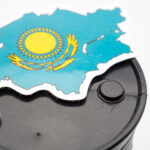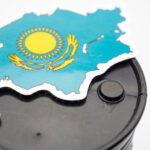Saudi Aramco indefinitely halts shipments of oil products to Egypt
Saudi Arabia’s state-owned oil giant Saudi Aramco has stopped the flow of oil products to Egypt as tensions between the two and the wider Arab world continue to worsen.
Egyptian officials confirmed Aramco notified the oil ministry that it would no longer continue shipments of oil products expected under a $23 billion aid deal made between the Arab world’s richest country and its most populous.
The flow of oil products came to stop in October, when, at the time, Egypt said it still expected flows to resume under its contracts with Aramco. It appears now, however, that the Saudi oil company has no intentions of resuming shipments to Egypt.
“They did not give us a reason,” an oil ministry official told Reuters. “They only informed the authority about halting shipments of petroleum products until further notice.”
The kingdom has been a major donor to Egypt since President Abdel Fattah al-Sisi took power in mid-2013, but relations between the two appear to be deteriorating as Saudi Arabia becomes disillusioned with Egypt, and Sisi’s government appears to be looking for help from Saudi Arabia’s regional rival, Iran.
Iran in the mix
Over the weekend, news broke that Egyptian Oil Minister Tarek El Molla planned to travel to Iran to strike new oil contracts with Saudi Arabia’s regional rival. Egypt and Iran have historically had a tenuous relationship since the 1970s, and increased cooperation between the two on oil would mark a shift away from Saudi Arabia, which has been fighting proxy battles with the Islamic State in the Middle East.
Molla and an Iranian oil official both denied reports suggesting the Egyptian minister would be visiting the country, but security sources and sources in Molla’s delegation said the minister had been scheduled for a low-key visit prior to the news going public.
Saudi Arabia and other Gulf Arab countries have pumped billions of dollars of aid into Egypt as Sisi tries to restart the economy following his ouster of the Muslim Brotherhood. Now, with the Brotherhood appearing less threatening, and Sisi apparently unable to revitalize the flagging economy, and unwilling to provide military backing to Riyadh in its war against the Iranian-backed Houthi group in Yemen, Saudi Arabia now seems to be pulling the plug on its aid programs in Egypt.
Egypt forced to pay $12 per ton over regional benchmarks in the spot market
Without the flow of oil products coming in from Saudi Arabia, Egypt is now forced to turn to spot markets to make up the difference. The deal with Aramco was for 700,000 metric tons of refined products per month for five years, and Egypt is now having to buy from spot markets at $12 over regional benchmarks per ton, according to a report from Bloomberg.
If Egypt hopes to make up the entirety of the lost Aramco shipments through spot market purchases, the country is looking at paying an additional $8.4 million per month over regional benchmarks. The Arabian Gulf Oman/Dubai crude oil price has averaged $43.87 per barrel so far in the month of November, according to Bloomberg.
Egypt has signed a number of deals with other oil producers, including a memorandum of understanding to import crude from Socar, Azerbaijan’s state-owned oil company, and a deal with Iraq on October 31 to form joint ventures to produce oil and natural gas.
Oil: a new front in regional rivalries
Aramco’s decision to halt shipments to Egypt looks to be a symptom of a larger problem between Saudi Arabia and Iran, which continues to cause friction in oil markets. Oil prices broke above $50 in October as OPEC said it planned to reach an agreement on production, but quickly fell in early November as sources inside the group said that Saudi Arabia has threatened to raise production even further in an attempt to hurt Iran if the Islamic Republic does not agree to cap its own production.
Iran has said that it supports a production deal, but that it will not join in cuts or capping its own production until its output reaches 12.7% of OPEC’s total ceiling, or about 4.2 MMBOPD. OPEC’s monthly report released in October pegged Iran’s production at 3.67 MMBOPD, while the country’s own reports have production slightly higher at 3.85 MMBOPD.
Rhetoric between the two countries is becoming increasingly aggressive, with Managing Director of the National Iranian Oil Company (NIOC) Ali Kardor saying: “Working in oil industry is like operating at war fronts and we have to preserve our trenches by raising our production capacity as much as we can. The next OPEC meeting is near and we will never cease to recapture our quota in the organization.”
Data released by Platts Friday showed OPEC raised production 300 MBOPD in October. The data was based on a survey of OPEC and oil industry officials, Platts said in a press release. The Platts data came out ahead of OPEC’s official monthly report, which will be released Friday, November 11.







